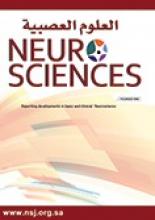Abstract
OBJECTIVE: The present study aimed to investigate the relationship between depressive symptoms in 6 months after stroke and the quality of life (QOL), clinical and socio-demographical characteristics, functional status, and severity of stroke.
METHODS: Ninety consecutive stroke patients who attended the neurology outpatient clinic at Erciyes University, Kayseri, Turkey from March 2004 to March 2005 were evaluated for the study. Seventy outpatients who had a stroke 6 months previously were included in the study. As a data-collecting device, Short Form 36, Functional Independence Measure (FIM), Canadian Neurological Scale, and Beck Depression Inventory (BDI) were used. In addition, a questionnaire was administered to obtain clinical and socio-demographic data.
RESULTS: Seventy patients were included in the study. Depression measured using BDI was identified in 47.1% of the patients. Total FIM scores, especially motor subscale scores, were decreased in the depressive patients. No difference was found in the stroke severity scores of the depressed and non-depressed patients. The QOL subscale scores, such as physical functioning, bodily pain, general health perception, vitality, social functioning, and mental health, were lower in the patient group with high BDI scores. There was a positive correlation between age and BDI scores of the patients. Negative correlations were found between the scores of QOL and FIM in both total and motor subscale scores.
CONCLUSION: Poststroke depression seems to be associated with age, education level, QOL, and functional status.
- Copyright: © Neurosciences
Neurosciences is an Open Access journal and articles published are distributed under the terms of the Creative Commons Attribution-NonCommercial License (CC BY-NC). Readers may copy, distribute, and display the work for non-commercial purposes with the proper citation of the original work.






